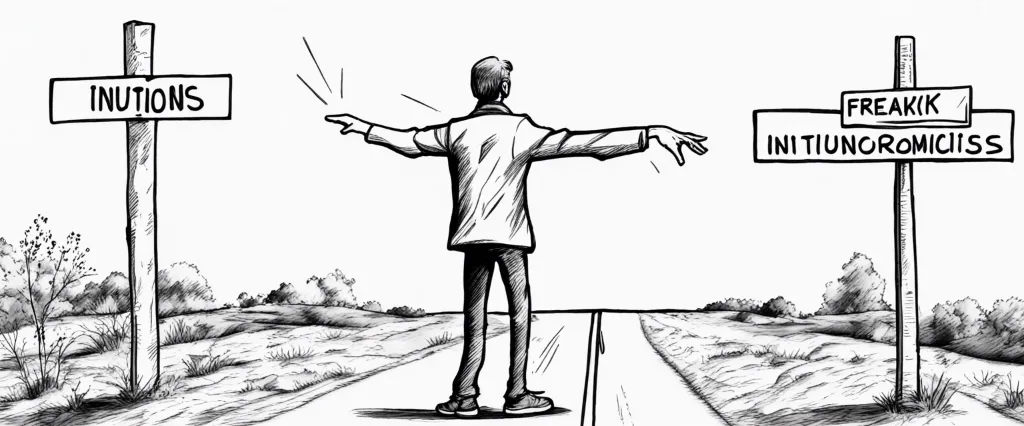——Freakonomics by Steven D. Levitt & Money Changes Everything by William N. Goetzmann

In the realm of economics and its far-reaching impact on the world, two remarkable literary works have emerged to shed light on the intricate web of financial influences. Steven D. Levitt, an innovative economist, teams up with journalist Stephen J. Dubner to present Freakonomics, a groundbreaking book that challenges conventional wisdom and transforms our understanding of economic principles. On the other hand, William N. Goetzmann takes us on a captivating journey through the history of finance in his illuminating work, Money Changes Everything. Both books delve into the captivating world of economics, but with diverse perspectives and objectives. While Freakonomics aims to unravel hidden economic patterns through unconventional lenses, Money Changes Everything presents a comprehensive historical exploration of how finance has shaped the course of human civilization. In this comparative study, we will delve into the unique contributions of each book, examining their distinctive approaches, arguments, and the broader implications they hold for our understanding of economics. By juxtaposing Freakonomics and Money Changes Everything, this study aims to shed light on the multifaceted nature of economics, offering readers a comprehensive perspective on this perpetually evolving field. Throughout these pages, the fundamental question remains: How do these two captivating books navigate the intricate world of economics, ultimately enriching our understanding of its consequential impact? Join us as we embark on a journey that unravels the diverse layers of economic thought, guided by the insights of Levitt, Dubner, and Goetzmann.
Brief Summary of Two Books
Freakonomics by Steven D. Levitt
“Freakonomics” by Steven D. Levitt is a non-fiction book that explores the hidden side of economics and human behavior. The book, co-authored by journalist Stephen J. Dubner, takes an unconventional approach to analyze various topics using economic principles and data-driven research.
The book consists of six chapters, each focusing on a different aspect of life and economics. Levitt begins by introducing the concept of incentives and how they can explain many apparently illogical behaviors. He then delves into controversial topics such as the correlation between abortion and crime rates, the influence of parenting on a child’s success, and the economics of drug dealing.
Levitt challenges conventional wisdom by examining the data and uncovering unexpected explanations or connections. For instance, he argues that the sharp drop in crime rates in the 1990s was not solely due to improved policing, but rather the result of increased access to abortion in the 1970s, which reduced the number of at-risk children being born.
In another chapter, he questions the impact of parenting on a child’s success by analyzing data from children’s names. Levitt suggests that low-income parents tend to give their children distinctively “black” names, which in turn leads to certain biases and disadvantages later in life. He argues that names themselves are not the direct cause of these outcomes, but rather indicative of larger socioeconomic factors.
The book also delves into the economics of drug dealing, showcasing how the drug trade operates more like a typical business rather than a violent underworld. Levitt explores the dynamics of supply and demand, the use of information asymmetry, and the influence of gang culture in drug markets.
Throughout “Freakonomics,” Levitt challenges common assumptions and biases, encouraging readers to think critically and explore the underlying factors that drive human behavior and shape society. By combining economic principles, data analysis, and storytelling, Levitt aims to bring a fresh perspective to the world of economics and demonstrate its relevance in unexpected areas of life.
Money Changes Everything by William N. Goetzmann
“Money Changes Everything” written by William N. Goetzmann explores the evolution and impact of finance throughout history. The book dives into various eras and regions, shedding light on the role of money in shaping societies, economies, and civilization as a whole.
Goetzmann begins by delving into the origins of money, examining how ancient cultures developed systems of exchange and trade. He highlights the transformative power of money, which facilitated the growth of civilizations and the creation of complex societies.
The book then moves on to explore different financial revolutions. From the development of financial markets in Renaissance Europe to the rise of the East India Company and the Industrial Revolution, Goetzmann explores the ways in which finance played a pivotal role in propelling economic growth and global expansion.
Goetzmann also examines the role of money in art and culture, discussing how it influenced artistic movements and shaped the art market. He explores the symbiotic relationship between finance and creativity, demonstrating how financial innovations allowed for the patronage of artists and the flourishing of artistic expression.
Furthermore, Goetzmann delves into the impact of finance on societal values and norms. He explores how money shapes human behavior, individual choices, and social relationships. From the pursuit of wealth to the impact of financial crises and inequality, the author delves into the societal implications of finance and the ways it both empowers and corrupts.
Throughout the book, Goetzmann combines historical analysis with engaging storytelling, making complex financial concepts accessible to readers from various backgrounds. He presents a comprehensive overview of the profound influence of money throughout history, highlighting its power to shape economies, art, and societies.
Comparison between Two Books

Similarities in Economics
There are several similarities between the book “Freakonomics” by Steven D. Levitt and “Money Changes Everything” by William N. Goetzmann when it comes to the topic of economics. These similarities can be observed in the following aspects:
1. Interdisciplinary Approach: Both books take an interdisciplinary approach to economics, exploring the subject through a combination of economics, statistics, social sciences, history, and psychology. By incorporating insights from various disciplines, these books provide a broader understanding of economic phenomena.
2. Examining Unconventional Topics: Both authors tackle unconventional and often surprising topics within the realm of economics. Levitt, in “Freakonomics,” investigates unexpected correlations and causations behind controversial issues like crime rates, abortion, and drug dealing. Similarly, Goetzmann’s “Money Changes Everything” delves into the history and cultural impact of money, rather than focusing solely on traditional economic theories.
3. Empirical Analysis: Both Levitt and Goetzmann emphasize the importance of empirical analysis in understanding economic behavior. Levitt, as an economist, uses extensive data analysis to uncover hidden patterns and debunk conventional wisdom. Goetzmann, as a financial economist, relies on historical evidence and case studies to examine the role of money throughout time.
4. Challenging Assumptions: Both authors challenge common assumptions and conventional economic wisdom. They question the traditional understanding of economic concepts and encourage readers to look beyond the obvious explanations. Through their research, they often arrive at unexpected conclusions that may challenge established economic theories.
5. Accessibility and Popular Appeal: Both books aim to make economics accessible and engaging for a broader audience. Levitt uses storytelling and real-life examples to present complex economic concepts in an engaging and relatable way. Similarly, Goetzmann incorporates historical anecdotes and narratives to make the subject more approachable.
In summary, “Freakonomics” by Steven D. Levitt and “Money Changes Everything” by William N. Goetzmann share similarities in their interdisciplinary approach, focus on unconventional topics, reliance on empirical analysis, tendency to challenge assumptions, and aim to make economics more accessible to a wider audience.
Divergences in Economics
Freakonomics by Steven D. Levitt and Money Changes Everything by William N. Goetzmann are both books that explore the field of economics, but they diverge in their approach, subject matter, and overall perspective.
In Freakonomics, Levitt takes an unconventional and contrarian approach to economics, challenging traditional assumptions and exploring seemingly unrelated topics. The book delves into various real-world phenomena, such as incentives, crime rates, and parenting, and applies economic thinking and analysis to explain their underlying causes. Levitt uses a data-driven approach to uncover hidden patterns, incentives, and causality, often drawing on his expertise as an economist and relying on statistical analysis.
On the other hand, Money Changes Everything by Goetzmann takes a historical and sociological approach to the study of economics. Instead of focusing on specific and distinct economic questions, Goetzmann explores the broader aspects of money and its impact on human societies throughout history. The book analyzes the evolution of money, its role in shaping civilizations, and its influence on culture, art, and politics. Goetzmann draws from a wide range of examples, from ancient civilizations to modern economies, to showcase the transformative power of money.
While both books intersect in their exploration of economics, they diverge in terms of their subject matter. Freakonomics primarily focuses on microeconomic analysis and the application of economic principles to decode obscure correlations, while Money Changes Everything takes a more macroeconomic and historical approach, examining the societal and cultural implications of money.
Moreover, the overall perspectives of the two books differ. Freakonomics challenges conventional economic wisdom by questioning conventional assumptions and debunking common myths. Levitt encourages readers to think critically about economic issues and to challenge established narratives. In contrast, Money Changes Everything adopts a more descriptive and observational tone, aiming to educate readers about the historical and cross-cultural significance of money.
In conclusion, while both Freakonomics by Steven D. Levitt and Money Changes Everything by William N. Goetzmann explore economic concepts, they diverge in their approaches, subject matter, and perspectives. Freakonomics stands out for its data-driven analysis and contrarian thinking, focusing on microeconomic topics, while Money Changes Everything offers a broader historical and sociological exploration, highlighting the impact of money on human societies throughout time.

Conclusion
Both Freakonomics by Steven D. Levitt and Money Changes Everything by William N. Goetzmann are highly regarded books that offer unique perspectives on economics and its influence on various aspects of life. Ultimately, the choice between the two depends on your specific interests and what you hope to gain from reading.
Freakonomics delves into the hidden side of economics by exploring unconventional topics and making connections between seemingly unrelated phenomena. Levitt, an economist, and journalist Stephen J. Dubner use data analysis to challenge conventional wisdom and provide thought-provoking insights. If you enjoy unorthodox approaches to economics and finding connections between different fields, Freakonomics may be the more suitable choice for you.
On the other hand, Money Changes Everything examines the development of finance over centuries and its impact on various aspects of society and culture. Goetzmann, a finance expert, explores the history of money and its influence on art, literature, science, and more. If you are interested in understanding the broader historical and cultural implications of finance, Money Changes Everything may be the more worthwhile read.
Both books offer unique perspectives on economics and its impact on different aspects of life. Ultimately, the choice boils down to your individual preferences and what particular aspects of economics you find most intriguing.



